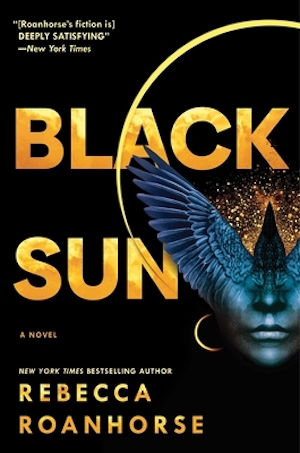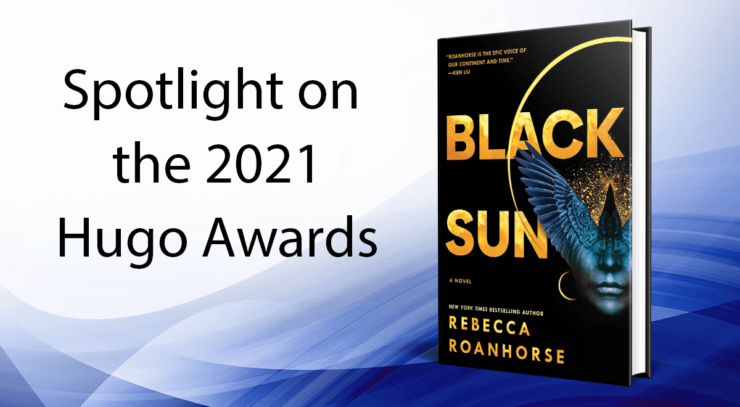In the lead-up to the 2021 Hugo Awards, we’re taking time to appreciate this year’s best novel Finalists, and what makes each of them great.
With Black Sun, Rebecca Roanhorse creates the world of the Sky Made clans, their powerful priests, and a boy who would hold a god inside himself to bring about a people’s vengeance and rebellion.
Touching on no particular civilization and, somehow, many, Roanhorse creates a unique mythology and builds a world at once recognizable and new, a breath of fresh air for all fantasy lovers, especially those who recognize that not all fantasy worlds are rooted in European-esque landscapes and harken back to the Celts. Magic, adventure and heroes are everywhere, but particularly potent and beautiful everywhere from Africa to the Caribbean to the Americas. Her characters are a perfect blend of anti-hero, adventurer, dreamers, zealots, and warriors.
In Tova, Naranpa is a newly made Sun Priest from the city’s slums, called the Coyote’s Maw, who clawed her way from servant in the Celestial Tower to ascend the priesthood’s leadership position. She seeks to re-strengthen the priesthood from its now mostly symbolic stature to unite the Sky Made clans once again. However, the city is still haunted by the horrific event called the Night of Knives a generation before, when the many of the Carrion Crow clan were slaughtered by the priesthood’s guards, called the Knives, to quell worship of their ancient gods. Naranpa must navigate the sinister plots of her fellow priests and the Carrion Crow cultists, who still believe their god will be reborn and ascend during the Convergence, when the sun, earth, and moon all align.
Buy the Book


Black Sun
In another country far from Tova, a young woman who was among the survivors of that tragic night made it her life’s mission to destroy the priesthood. She raised her son, Serapio, until he is twelve, when she forces him to stare straight into an eclipse, blinding him and sealing in the crow god’s power. A decade later, it is through Serapio’s journey we meet a Teek captain, Xiala, the most intriguing of Roanhorse’s characters. The Teek are a mysterious sea-faring female-only clan that live on a mythical island, whose power comes from their Song. Xiala was cast out of her home and has gone aimlessly from boat to boat, using her special Teek navigational system. After a botched job, she wakes in a jail after drowning her sorrows in drink and a beautiful woman, to be rescued by a lord who commissions her to take a mysterious young man to Tova in twenty days.
So begins the journey of Xiala and Serapio, who grow ever closer as they navigate both a treacherous sea and crew, and unveil the secrets of their personal magic. Serapio must reach Tova on the Convergence to fulfill his destiny, which he wholly embraces, and Xiala discovers she might want solid ground after all. Through it all, utterly ignorant of the god who is coming for her, Naranpa must discover how far she is willing to go for her own ideals.
Black Sun thrives with magic and culture that harkens back to great empires such as the Aztec and Mayan. I can see the red rock walls of my own beloved home of New Mexico, as well as my own ancestors, the Lokono, great sailors who journeyed by canoe from South America to settle on the Caribbean islands. The magical crows and insects that the Sky Clans ride and the majestic city of Tova, as well as Xiala’s Song, are all part of a magical fabric that you want to wrap around yourself and wear proudly.
In her acknowledgements, Roanhorse stresses that this is not a history book, that she mixed cultures and completely concocted many other parts. The topic of cultural appropriation is a thorny one, especially within BIPOC communities. My own background is white European and Indigenous-West African Caribbean, so I can only speak from that place. I still continually seek to learn about my ancestors, decolonize my mind and body, while acknowledging my enormous privileges and cede space to those who don’t have those same privileges. It must be said, however, that we are hardest on our own people and that we have internalized the colonizer’s oppression so wholly that we repeat many of the cruel, hurtful things they have done to us. We have incorporated what they tell us is whiteness and what is not whiteness too well. We become their best weapons when we allow ourselves to live within their poisonous constructs.
We must move beyond whiteness and the fantasy genre must be uncolonized, as well. As I’ve written before, it is imperative our imaginations free themselves from the European/U.S. definitions of borders and what can be, let alone what can be written. I believe this is what Roanhorse accomplishes with her work and she does it extremely well. I know she, like many of us, is working from a place of love and learning. So I welcome Black Sun with open arms, as I hope you do, as well.
An earlier version of this article was originally published in October 2020.
Angela Maria Spring is the owner of Duende District, a mobile boutique bookstore by and for people of color, where all are welcome. She holds an M.F.A. in poetry from Sarah Lawrence College, was a 2018 Kirkus Fiction Prize judge, and has work forthcoming in Radar Poetry, Pilgrimage, Borderlands: Texas Poetry Review, and Third Wednesday. You can find her on Twitter at @BurquenaBoricua or at duendedistrict.com.










